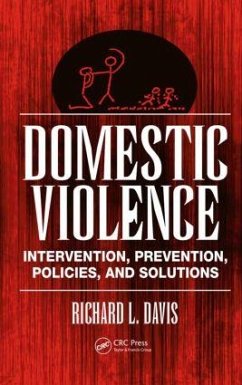
Versandkostenfrei!
Versandfertig in 1-2 Wochen

PAYBACK Punkte
85 °P sammeln!




Recantation and Domestic Violence empowers people and communities in improving their understanding of and skills in domestic violence cases that involve recantation.
Amy Bonomi, PhD, MPH, is Professor and Associate Dean of Strategic Initiatives in the College of Health and Human Services at Northern Arizona University, Founder of Social Justice Associates, Faculty Affiliate at the Harborview Injury Prevention and Research Center, and Consultant for the U.S. Department of Justice. Bonomi's distinguished career as an award-winning professor at the Ohio State University and Michigan State University includes widely cited research on domestic violence, recantation, and longterm health impacts. Bonomi and her research team (including David Martin) published the five-stage model of how domestic abusers tamper with and coerce victims to recant. The five-stage model (along with the team's subsequent publications) has been used to train professionals globally. Bonomi continues the practice of expert testimony work to describe the dynamics of recantation. As a result of her work in recantation and broader domestic violence topics, Bonomi received the Distinguished Scholar Award from the Ohio State University and was named Diversity Champion in the College of Social Science at Michigan State University. Bonomi is appointed by the U.S. Health and Human Services Secretary (Xavier Becerra) as Chair of the Board of Scientific Counselors for the National Center for Injury Prevention and Control and serves as an elected peer reviewer (for violence prevention research) for the U.S. Centers for Disease Control and Prevention and the National Institute of Justice. David Martin, JD, is Senior Deputy Prosecutor for the King County Prosecuting Attorney's Office (KCPAO) in Seattle, Washington. He serves as Supervisor of the KCPAO Domestic Violence (DV) unit, Comanager of the King County Regional DV Firearms Enforcement Unit, and Fulbright Specialist in Gender-Based Violence response. Almost all of his 25-year career as a prosecutor has been spent in the DV unit. Martin has created innovative responses to serve victims of DV from the first evidence rule on immigration to systemic provision of civil legal aid in criminal cases, to diversion and sentence alternatives for defendants with past histories of gender violence victimization. Martin serves on numerous DV task forces and work groups, is Chair of the national Association of Prosecuting Attorney's DV Committee. He has authored several of Washington's criminal DV laws including felony sentencing reform, removal of the marital rape exception, stalking reform, batterer treatment reform, felony strangulation, and repeat DV assault. Martin is coauthor of Washington's statewide DV prosecution manual, articles on strangulation, and recantation together with Dr. Amy Bonomi. He has served on the board of multiple community-based DV organizations. He provides training and consultation on DV issues locally, nationally, and internationally. He is the recipient of the Prosecuting Attorney's Outstanding Trial Advocacy Award, Lifewire Norm Maleng Award, Consejo Founder's Award, and Coalition Ending Gender Based Violence System Change Award.
Produktdetails
- Verlag: Routledge
- Seitenzahl: 100
- Erscheinungstermin: 12. Dezember 2023
- Englisch
- Abmessung: 250mm x 175mm x 10mm
- Gewicht: 367g
- ISBN-13: 9781032391687
- ISBN-10: 1032391685
- Artikelnr.: 68716063
Herstellerkennzeichnung
Libri GmbH
Europaallee 1
36244 Bad Hersfeld
gpsr@libri.de
Für dieses Produkt wurde noch keine Bewertung abgegeben. Wir würden uns sehr freuen, wenn du die erste Bewertung schreibst!
Eine Bewertung schreiben
Eine Bewertung schreiben
Andere Kunden interessierten sich für













